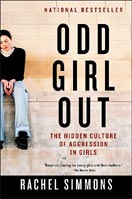Anyone with a daughter past pre-school age ought to read this book… immediately.
In fact, I’d suggest that you share parts of it with your daughters. It will serve as a powerful
discussion driver.
Odd Girl Out provides an in-depth exploration of “alternative aggression” (rumor
spreading, non-verbal gestures, alliance building, shunning, etc.), an undeniable part of girl culture.
If your daughter hasn’t yet been brushed or battered by this behavior at the hands of her so-called
friends, she’s lucky. Unfortunately, she’s very likely to encounter it in one degree or another
before she graduates high school.
Here’s the problem: middle-class girls are socialized to be “nice.” Because all human
beings (including nice girls) sometimes have intense feelings of jealousy, resentment, competition, and
unadulterated anger toward their friends, girls are in a terrible bind. They simply don’t have the
tools or the role models for being “nice” and “angry.” Nor can they give
themselves permission to be direct and assertive… not when it comes to their friends. Therefore
they must figure out ways to vent their inevitable aggression covertly and/or swallow their hurt when they’re
targeted.
Since
relationship is precisely what good, ‘perfect’ girls are expected to be in, its loss, and the prospect of solitude, can be the most pointed weapons in the hidden culture of girls’ aggression.
—Rachel
Simmons
If you’ve ever heard your daughter talk about what other girls have done (they rarely admit to any
of this behavior themselves) you can’t help but be amazed at how convoluted, controlling, calculating
and manipulative it all is. Through Simmons’ very personal interviews with 5th-12th graders, moms,
and some twenty and thirtysomethings, she shines a light on the little known world of girl culture where
abuse and emotional devastation mostly exists below the radar of parents and teachers.
When adults become aware of what’s going on, they have trouble understanding how otherwise
nice girls could so callously commit such cruel acts. And why would the targeted girls refuse to stand
up for themselves and instead, remain in these abusive friendships?! For girls, the reasons are perfectly
logical. They clearly explain that they put up with abuse because the alternative, social isolation, is
worse than death. As Simmons puts it, “Since relationship is precisely what good, ‘perfect’ girls
are expected to be in, its loss, and the prospect of solitude, can be the most pointed weapons in the hidden
culture of girls’ aggression.”
Visit Rachel Simmons’ Web site here.
More Recommended Parenting Books »




